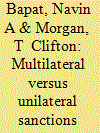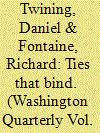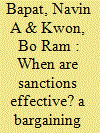| Srl | Item |
| 1 |
ID:
092342


|
|
|
|
|
| Publication |
2009.
|
| Summary/Abstract |
Policymakers frequently argue that multilateral sanctions are more likely to induce a target state to alter its behavior than are unilateral sanctions. Repeated empirical studies using the familiar Hufbauer, Schott, and Elliot data set demonstrate that unilateral sanctions "work" more often than multilateral sanctions, however. In this study, we subject three theoretical explanations for this counterintuitive finding to additional empirical testing utilizing the new Threat and Imposition of Economic Sanctions (TIES) data. Somewhat surprisingly, the analyses using these new data support the intuition of policymakers; that is, multilateral sanctions do appear to work more frequently than do unilateral sanctions. Our results do support one theoretical argument, based on spatial models, that we test. This explanation holds that whether multilateral or unilateral sanctions are more effective depends on the number of issues at stake and on whether an international institution is involved. Our analyses provide support for these hypotheses.
|
|
|
|
|
|
|
|
|
|
|
|
|
|
|
|
| 2 |
ID:
106692


|
|
|
| 3 |
ID:
139791


|
|
|
|
|
| Summary/Abstract |
Although a considerable literature identifies the conditions under which sanctions are more likely to be successful, few studies examine the question of when sanctioning states or senders are willing to enforce their sanctions laws against their firms. Using a game theoretic model, we argue that imposing sanctions creates a strategic dilemma for senders. We demonstrate that senders often have disincentives to enforce their sanctions policies, given that the restriction on economic transactions with targeted states may undermine their firms' competitiveness. The model indicates that sanctions are more likely to succeed when the sender's firm retains a moderate share of the target's market relative to its foreign competitors. However, the model also demonstrates that sanctions are likely to be imposed only when the conditions do not favor their success. The empirical implications of the model are tested using the Threat and Imposition of Economic Sanctions (TIES) data set.
|
|
|
|
|
|
|
|
|
|
|
|
|
|
|
|